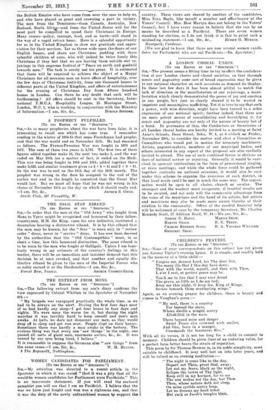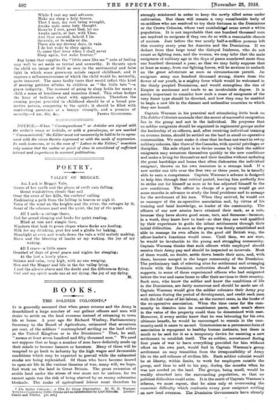CHILDREN'S PRAYERS.
[To THE EDITOR OF THE "SPECTATOR."] Sra,—None of your correspondents on this subject has yet given you Jeremy Taylor's evening hymn. It is simple, and readily held in the memory of a little child :— "Forgive me, dearest Lord, for Thy dear Son, The many ills that I this day have done; That with the world, myself, and then with Theo, I, e'er I rest, at perfect peace may be.
Teach me to live that I may ever dread The grave, as little as I do my bed; Keep me this night, 0 keep me, King of Kings, Secure beneath thine everlasting wings."
Again, as an evening prayer for children, there is beauty and repose in Vaughan's poem
"My soul, there is a country Far beyond the stars, Where dwells a winged sentry All-skilful in the wars.
There beyond noise and danger Sweet Peace sits crowned with smiles, And One, born in a manger, Commands the beauteous files."
With all its verses, it is not too long for a child to commit to memory. Children should be given lines of an enduring value, for
a perfect form better bears the strain of repetition.
This poem by Sir Thomas Browne is, in its noble simplicity, most suitable to childhood. It may well last on into later years, and
still be valued as an evening meditation :— "The night is come like to the day.
Depart not Thou, great God, away;
Let not my fears, black as the night,
Eolipse the lustre of Thy light. Keep still in my horizon, for to me The sun makes not the day, but Thee.
Thou, whose nature doth not sleep, On mine eyelids sentry keep, Let no dreams my head infest
But such as Jacob's temples blest.
While I rest my soul advance, Make my sleep a holy trance, That I may, my rest being wrought. Awake unto some holy thought. Howe'er I rest, great God, let me Awake again, at last, with Thee, And thus assured, behold I lie Securely, or to wake or die. These are my drowsy days, in vain I do but wake to sleep again; 0, come that hour when I shall never Sleep again, but wake forever."
Any hymn that supplies the "little ones like me" note of feeling may well be set aside as trivial and unworthy. It thrusts upon the child an image of itself as seen in the sentimental and false light in which some grown-up minds regard childhood; and it imposes a self-consciousness of which the child would be, normally, quite innocent. The same faulty taste that would inflict this kind of evening petition alludes to children as "the little tots "—a grave indignity. The moment of going to sleep holds for many a child a sense of loneliness and nameless dread. This often hedges the hour of bedtime about with apprehension. Therefore the evening prayer provided in childhood should be of a broad pro- tective nature, composing to the spirit; it should be filled with comforting assurance of a benign strength, and a promise of



































 Previous page
Previous page